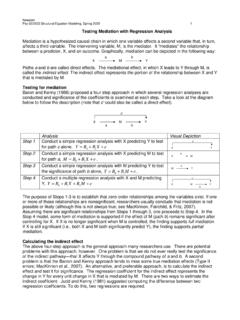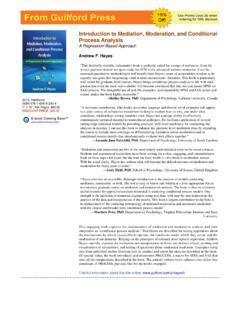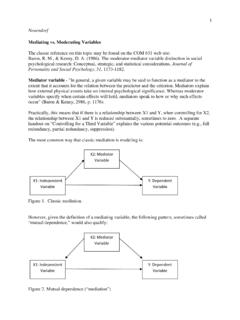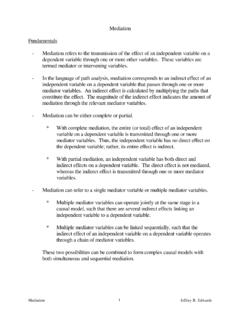Transcription of SELF ASSESSMENT STRENGTHS WEAKNESSES STRENGTHS
1 SELF ASSESSMENT . (Able to learn through awareness of own STRENGTHS and WEAKNESSES ). STRENGTHS . I discovered that I possess the following qualities and STRENGTHS that I believe will positively impact the mediation Process. My background as a senior administrator working in a judicial environment also considerably helped me in this regard. Active and Empathetic Listener: A mediator must be a good listener. I view this as one of my greatest assets and STRENGTHS . During our sessions, it was not too difficult for me to listen to the presentations of the parties, taking a firm grasp of important details. This might be attributable to my background as an administrator, who daily interacts with people at different levels. I patiently and actively listened to the parties while at the same time taking down vital notes of their submissions.
2 Neutral and Non- Judgmental: My training as an administrator also helped me to keep out of the arena of conflict, maintaining a neutral and impartial posture. Being neutral is key in mediation as the mediator must assist parties in working towards a settlement. Taking sides will obviate this and destroy the basis of a good mediation . Flexibility: I also consider my flexibility as an area of strength . During the sessions I. realized that my flexibility, enhanced the flow of discussion of the parties while keeping them focused on the issues at hand. I believe that parties should not be kept in a straightjacket but should be encouraged to explore new avenues. This is the only way parties can be moved towards settlement on terms acceptable to them.
3 Flexibility as an attribute also had a way of making the parties comfortable, thereby making them talk freely albeit in a relaxed and confidential manner. Furthermore, being flexible yet firm helps me to be considerate at the same time retaining high principles when dealing with the people. Imaginative and Resourceful: In addition to this is the quality of being imaginative and resourceful, adding fresh ideas or perspective to discussions especially when it seemed parties were approaching a deadlock. It was important to leave parties in control of the terms of settlement or decisions An effective chairperson: In as much as mediation is an informal process, at the beginning, ground rules must be developed to define and structure the process.
4 I was able to apply these ground rules evenly and effectively. The mediator must therefore be able to effectively control and manage the process so that one party does not take over the reign of affairs. I found that I thus played the role of a chair-person, providing firm but sensitive control and helping the parties towards agreement. A Scribe: I realized that my background as a lawyer will help me in effectively noting the points agreed upon and also help the parties to craft an agreement that is mutually beneficial and that the terms accurately reflect the intentions of the parties. Intelligence: intelligence is a key attribute which I posses and which has also helped me during mediation . Parties in mediation consciously or unconsciously expect the mediator to help them resolve their problem and a mediator must leave up to this expectation.
5 While they must educate the mediator about their problem, they do not want to be handicapped by the mediator's slowness of mind. Also, I try as much as possible to acquire knowledge in other fields outside of law. Patient with learners: Over time, as a lawyer and mother, I have developed the virtue of patience as I relate with my clients and children. In mediation , this enables me to be patient with parties as I take them through the different phases of the mediation process at their own pace. Sensitivity of a social worker: Being sensitive to peoples' plight is one quality I. believe helps me to reach out to disputing parties and being willing to assist them to resolve their disputes. Appreciation of Cultural Diversities: As an administrator dealing with people from different backgrounds on a daily bases, I see the need to appreciate divergent views and perceptions based on cultural diversities.
6 Realizing that no two people are exactly alike and that our differences are usually based on circumstances of birth and other factors beyond our control, I have expunged from my system, all tribal, regional, national, political and social bias enabling me to easily develop rapport with people. This disposition makes mediation very appealing to me. WEAKNESSES . As an imperfect person, I appreciate that I have to work on the following areas in order to improve my mediation practice: Creating an informal atmosphere: My background as a Lawyer sometimes makes me a bit formal than I should be in mediation . I have however realized that for mediation to be effective the atmosphere must be relaxed. During mediation , a more informal atmosphere must be created.
7 Reaching Conclusions: In an attempt to quickly get to the settlement, I realized that I. have a tendency to suggest settlement terms to the parties. mediation is a party driven process and ONLY the parties can agree on the terms and they should be encouraged to decide the outcome. This will ensure that they are more willing to abide by the terms of the agreement. Talking to parties equally: I observed that I was not entirely impartial to the parties as I found myself not talking equally to the parties. Not talking to them equally had a way of creating an appearance of bias, even where none actually existed. Talking to parties equally is important in mediation and I have to improve on that aspect. Remembering the names of the parties: I found that I was mixing up the names of the parties during the session.
8 Parties usually appreciate being called by their names. I therefore need to work on remembering the names of parties as they introduce themselves to me. This I believe I can actually start doing in my daily interactions. Use of silence and minimal verbal prompts: In mediation , there is need to listen actively to parties and to effectively use silence and minimal verbal prompts. I tend to be uncomfortable when people are silent and sometimes I feel I should generate discussions and fill the space instead of just listening. I therefore need to work on this. Adversarial approach: With a legal background, I sometimes conduct mediation like a conventional courtroom trial, asking closed and interrogative questions. This may make parties feel that they are being cross-examined.
9 Leading Questions: Because I sometimes tend to have a fair idea of possible solutions, I have a strong inclination towards asking leading instead of open questions. I certainly need to work on this. Reality- testing : While doing reality testing , I sometimes find myself challenging parties and being quick to spot inconsistencies and loopholes in their proposals. This may make the parties uncomfortable and may retard the flow and quality of information that they will be willing to divulge. I will need to be more subtle and use more of open questions and selective clarification and hypothetical questions when doing reality testing of proposals made by parties. Exploration: I will need to work more on the exploration stage of mediation to properly identify all the issues in dispute to ensure that all relevant concerns, interests and needs of the parties are effectively addressed.
10 Body language and Posture: I also need to be more observant of my posture and body language so as not to send out wrong signals to the parties. We are operating under varying cultural, religious and ethnic settings in Nigeria that one must put into consideration. There are some culture for instance that will not permit a lady to stretch her hand first to a man. Use of Flip Chart: I have to make consciously make more active use of the flip chart board to identify the issues, focus parties on the main points and provide basis for further discussion. ACTION PLAN. My plan is to use my position to further the practice of mediation in particular and ADR. generally. There are cases which must necessarily go to court, but experience has shown me that 80% of the cases in court have no business being there.









